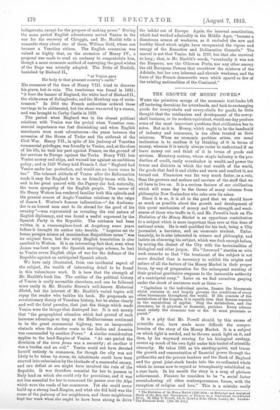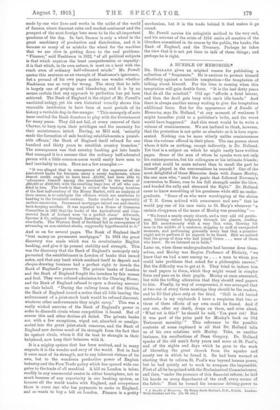THE GROWTH OF MONEY POWER.*
WHEN the primitive savage of the economic text-books left off bartering deerskins for arrowheads, and took to exchanging goods for cowry-shells and cowry-shells for goods, be little
thought that the mechanism and development of the cowry- shell business, or its modern equivalent, would one day produce some of the most important questions that civilization has to solve. But so it is. Money, which ought to be the handmaid of industry and commerce, is too often treated as their mistress. When an economic problem arises, our usual inclination is to confuse it by thinking of it in terms of money, whereas it is nearly always easier to understand if we leave money out and think of it in terms of goods and services. Monetary centres, whose staple industry is the pro- duction of credit, easily overshadow in wealth and power the towns and districts in which the real wealth of the world, the goods that feed it and clothe and warm and comfort it, are turned out Financiers wax fat very much faster, as a rule, than the growers and makers and carriers of the stuff that we all have to live on. It is a curious feature of our civilization which will some day be the theme of many volumes from philosophic New Zealanders who rake over its ashes.
Since it is so, it is all to the good that we should know as much as possible about the growth and development of this queer mechanism of money and the strength and weak- nesses of those who traffic in it, and Mr. Powell's book on The Evolution of the Money Market is an opportune contribution to a subject which is more important than ever at this time of national crisis. He is.well qualified for his task, being a. City journalist, a barrister, and an economic student. Unfor- tunately, he is also interested in science and philosophy, and insists on obscuring his subject, which was dark enough before, by mixing the dialect of the City with the technicalities of biological and other jargon. His "foreword" startles us with such remarks as that " the treatment of the subject in not more detailed than is necessary to exhibit the origins and nature of all the factors of the Money Market in their proper focus, by way of preparation for the subsequent scrutiny of their gradual gravitative response to the inexorable authority of a centripetal sway." Later on we find ourselves gasping under the shock of sentences such as these :-
" Capitalism is the individual species, finance the biocomoais which contains it, and largely governs the conditions of every other biocomosis throughout the world. If life consists of the metabolism of the biogens, it is equally true that finance consists in the metabolism of capital. Stop the metabolism, and the structure, be it physical or financial, perishes. Every scheme) must satisfy the economic test or die. It must procreate or perish."
It is a pity that Mr. Powell should, by this excess of scientific zeal, have made more difficult the compre- hension of the story of the Money Market. It is a subject on which light is needed, and he throws much light on it, and then, by his wayward craving for his biological analogy, covers up much of his own light under this bushel of scientific obscurity. He takes 1385 as his starting-point, and traces the growth and concentration of financial power through the goldsmiths and the private bankers and the Bank of England
and the great joint-stock banks into the co-ordinated whole which he seems now to regard as triumphantly established on
a sure basis. In his mouth the story is a song of glorious achievement. Finance he considers to be "a social factor overshadowing all other contemporaneous forces, with the exception of religion and love." This is a mistake easily
* Tho Evolution of the Money Market (13854515): an /figtorion/ and Analytical Study of the 1(iso. and Development of Finance as a Contratised CoordinatedForce. By Ellis T. Powell, LL.B. (Loud.), B.Sc. (Econ. Loud.), dtc. London: The Financial Nem. [103. 6d. net.]
made by one who lives and works in the midst of the world of finance, where discount rates and market sentiment and the prospect of the next foreign loan seem to be the all-important questions of the day. In fact, finance is only a wheel in the great machinery Of production and distribution, and it is because so many of us mistake the wheel for the machine that we are slow in getting down to the real problems. " Finance," said Finekisson in 1822, " of all political subjects
is that which requires the least comprehension or capacity: it is that which, in its own nature, is most on a level with the reach even of ordinary half-educated minds." Mr. Powell
quotes this sentence as an example of Husk isson's ignorance, but a perusal of his own pages makes one wonder whether Huskisson was so very far wrong. The story that he tells is largely one of groping and blundering, and it is by no means certain that any approach to perfection has yet been
achieved. The Bank Of England is the object of Mr. Powell's unstinted eulogy, yet his own historical veracity shows this venerable institution to have been at most periods of its history a veritable dog-in-the-manger. "This monopoly of note issue enabled the Bank directors to play with the Government for many years. They did not fail, at every renewal of their Charter, to harp upon their privileges and the necessity for their maintenance intact. Having, as Mill said, ' actually made the formation of safe banking establishments a punish- able offence,' the Bank of England itself refused for one hundred and thirty years to establish country branches." The consequence was that country banking got into hands that managed it in a manner that the ordinary half-educated person with a little common-sense would easily have seen to lead inevitably to ruin. Here are a few examples :- "It was alleged that in consequence of the eagerness of the joint-stook banks for business, many a needy tradesman, whose utmost credit ought to have been £3,000, had been able to • adventure himself among the merchants' to the extent of 280,000 or £100,000, with the resulting huge loss of all who con- fided in him. The truth is that to review the banking troubles of the first half-century of the Money Market, with an analysis of their causes, is to catalogue the offences which are anathema to banking in the twentieth century. Banks crashed in apparently endless succession. Permanent mortgages ruined one and chaotic book-keeping another. It.was reported to a House of Commons Committee in 1837 that the books of the Agricultural and Com- mercial Bank of Ireland were 'in a perfect chaos.' Attwoods, Spooner & Co. collapsed through financing its partners by huge overdrafts. The Western Bank of Scotland fell in consequence of advancing on non-existent stocks, supposedly hypothecated to it."
And so on for several pages. The Bank of England itself "lent money on permanent mortgages." In 1834 the great • discovery was made which was to revolutionize English banking, and give it its present stability and strength. This was the discovery that the Bank of England's monopoly only prevented the establishment in London of banks that issued
notes; and that any bank which confined itself to deposit and Cheque-drawing business had a perfect right to invade the Bank of England's preserve. The private banks of London
and the Bank of England fought the invaders by fair means and foul. They were refused admission to the Clearing House, and the Bank of England refused to open a drawing account on their behalf. "During the railway boom of the thirties, the Bank of England issued a notice that all bills bearing the endorsement of a joint-stock bank would be refused discount, whatever other endorsements they might carry." This was a really wicked exercise of the Bank of England's power in order to discredit rivals whose competition it feared. But of course this and other devices all failed. The private banks are, with a few exceptions, wiped out, absorbed or amalga- mated into the great joint-stook concerns, and the Bank of England now derives much of its strength from the fact that its upstart rivals, whom it did its best to strangle in their babyhood, now keep their balances with it.
It is a mighty system that has been evolved, and in many respects it is the wonder and envy of the world. But in fact it owes most of its strength, not to any inherent virtues of its own, but to the wondrous productive power of English industry and the Free Trade policy which has opened wide our gates to the trade of all mankind. A bill on London is taken readily in any commercial centre in either hemisphere, not so much because of any superiority in our banking system, as because all the world trades with England, and everywhere there is some one who has payments to make to England, and so wants to buy a bill on London. Finance is a pretty
mechanism, but it is the trade behind it that makes it go round.
Mr. Powell carries his eulogistic method to the very end, and his account of the crisis of 1914 omits all mention of the blunders committed in its course by the public, the banks, the Bank of England, and the Treasury. Perhaps he takes the view that it is not yet time to talk of these things; and perhaps he is right.



































 Previous page
Previous page